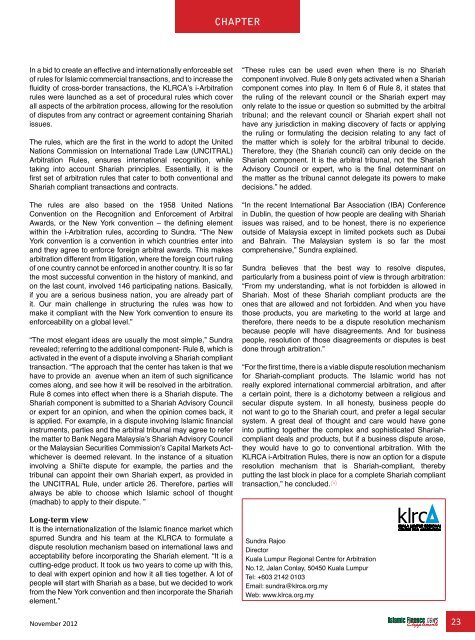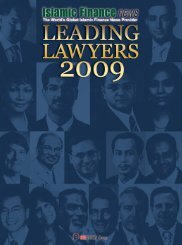Sukuk & Capital Market - Islamic Finance News
Sukuk & Capital Market - Islamic Finance News
Sukuk & Capital Market - Islamic Finance News
You also want an ePaper? Increase the reach of your titles
YUMPU automatically turns print PDFs into web optimized ePapers that Google loves.
chapter<br />
In a bid to create an effective and internationally enforceable set<br />
of rules for <strong>Islamic</strong> commercial transactions, and to increase the<br />
fluidity of cross-border transactions, the KLRCA’s i-Arbitration<br />
rules were launched as a set of procedural rules which cover<br />
all aspects of the arbitration process, allowing for the resolution<br />
of disputes from any contract or agreement containing Shariah<br />
issues.<br />
The rules, which are the first in the world to adopt the United<br />
Nations Commission on International Trade Law (UNCITRAL)<br />
Arbitration Rules, ensures international recognition, while<br />
taking into account Shariah principles. Essentially, it is the<br />
first set of arbitration rules that cater to both conventional and<br />
Shariah compliant transactions and contracts.<br />
The rules are also based on the 1958 United Nations<br />
Convention on the Recognition and Enforcement of Arbitral<br />
Awards, or the New York convention – the defining element<br />
within the i-Arbitration rules, according to Sundra. “The New<br />
York convention is a convention in which countries enter into<br />
and they agree to enforce foreign arbitral awards. This makes<br />
arbitration different from litigation, where the foreign court ruling<br />
of one country cannot be enforced in another country. It is so far<br />
the most successful convention in the history of mankind, and<br />
on the last count, involved 146 participating nations. Basically,<br />
if you are a serious business nation, you are already part of<br />
it. Our main challenge in structuring the rules was how to<br />
make it compliant with the New York convention to ensure its<br />
enforceability on a global level.”<br />
“The most elegant ideas are usually the most simple,” Sundra<br />
revealed; referring to the additional component- Rule 8, which is<br />
activated in the event of a dispute involving a Shariah compliant<br />
transaction. “The approach that the center has taken is that we<br />
have to provide an avenue when an item of such significance<br />
comes along, and see how it will be resolved in the arbitration.<br />
Rule 8 comes into effect when there is a Shariah dispute. The<br />
Shariah component is submitted to a Shariah Advisory Council<br />
or expert for an opinion, and when the opinion comes back, it<br />
is applied. For example, in a dispute involving <strong>Islamic</strong> financial<br />
instruments, parties and the arbitral tribunal may agree to refer<br />
the matter to Bank Negara Malaysia’s Shariah Advisory Council<br />
or the Malaysian Securities Commission’s <strong>Capital</strong> <strong>Market</strong>s Actwhichever<br />
is deemed relevant. In the instance of a situation<br />
involving a Shii’te dispute for example, the parties and the<br />
tribunal can appoint their own Shariah expert, as provided in<br />
the UNCITRAL Rule, under article 26. Therefore, parties will<br />
always be able to choose which <strong>Islamic</strong> school of thought<br />
(madhab) to apply to their dispute. ”<br />
Long-term view<br />
It is the internationalization of the <strong>Islamic</strong> finance market which<br />
spurred Sundra and his team at the KLRCA to formulate a<br />
dispute resolution mechanism based on international laws and<br />
acceptability before incorporating the Shariah element. “It is a<br />
cutting-edge product. It took us two years to come up with this,<br />
to deal with expert opinion and how it all ties together. A lot of<br />
people will start with Shariah as a base, but we decided to work<br />
from the New York convention and then incorporate the Shariah<br />
element.”<br />
“These rules can be used even when there is no Shariah<br />
component involved. Rule 8 only gets activated when a Shariah<br />
component comes into play. In Item 6 of Rule 8, it states that<br />
the ruling of the relevant council or the Shariah expert may<br />
only relate to the issue or question so submitted by the arbitral<br />
tribunal; and the relevant council or Shariah expert shall not<br />
have any jurisdiction in making discovery of facts or applying<br />
the ruling or formulating the decision relating to any fact of<br />
the matter which is solely for the arbitral tribunal to decide.<br />
Therefore, they (the Shariah council) can only decide on the<br />
Shariah component. It is the arbitral tribunal, not the Shariah<br />
Advisory Council or expert, who is the final determinant on<br />
the matter as the tribunal cannot delegate its powers to make<br />
decisions.” he added.<br />
“In the recent International Bar Association (IBA) Conference<br />
in Dublin, the question of how people are dealing with Shariah<br />
issues was raised, and to be honest, there is no experience<br />
outside of Malaysia except in limited pockets such as Dubai<br />
and Bahrain. The Malaysian system is so far the most<br />
comprehensive,” Sundra explained.<br />
Sundra believes that the best way to resolve disputes,<br />
particularly from a business point of view is through arbitration:<br />
“From my understanding, what is not forbidden is allowed in<br />
Shariah. Most of these Shariah compliant products are the<br />
ones that are allowed and not forbidden. And when you have<br />
those products, you are marketing to the world at large and<br />
therefore, there needs to be a dispute resolution mechanism<br />
because people will have disagreements. And for business<br />
people, resolution of those disagreements or disputes is best<br />
done through arbitration.”<br />
“For the first time, there is a viable dispute resolution mechanism<br />
for Shariah-compliant products. The <strong>Islamic</strong> world has not<br />
really explored international commercial arbitration, and after<br />
a certain point, there is a dichotomy between a religious and<br />
secular dispute system. In all honesty, business people do<br />
not want to go to the Shariah court, and prefer a legal secular<br />
system. A great deal of thought and care would have gone<br />
into putting together the complex and sophisticated Shariahcompliant<br />
deals and products, but if a business dispute arose,<br />
they would have to go to conventional arbitration. With the<br />
KLRCA i-Arbitration Rules, there is now an option for a dispute<br />
resolution mechanism that is Shariah-compliant, thereby<br />
putting the last block in place for a complete Shariah compliant<br />
consulting www.<strong>Islamic</strong><strong>Finance</strong>Consulting.com<br />
www.<strong>Islamic</strong><strong>Finance</strong>Events.com<br />
transaction,” he concluded.<br />
www.<strong>Islamic</strong><strong>Finance</strong><strong>News</strong>.com<br />
www.<strong>Islamic</strong><strong>Finance</strong>Training.com<br />
www.MIFforum.com<br />
www.MIFmonthly.com<br />
www.MIFtraining.com<br />
www.REDmoneyBooks.com<br />
Sundra Rajoo<br />
Director<br />
Kuala Lumpur Regional Centre for Arbitration<br />
No.12, Jalan Conlay, 50450 Kuala Lumpur<br />
Tel: +603 2142 0103<br />
Email: sundra@klrca.org.my<br />
Web: www.klrca.org.my<br />
November 2012 23

















